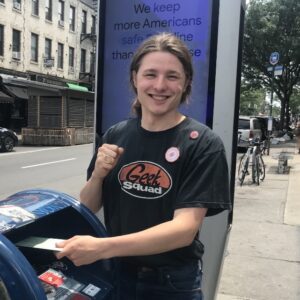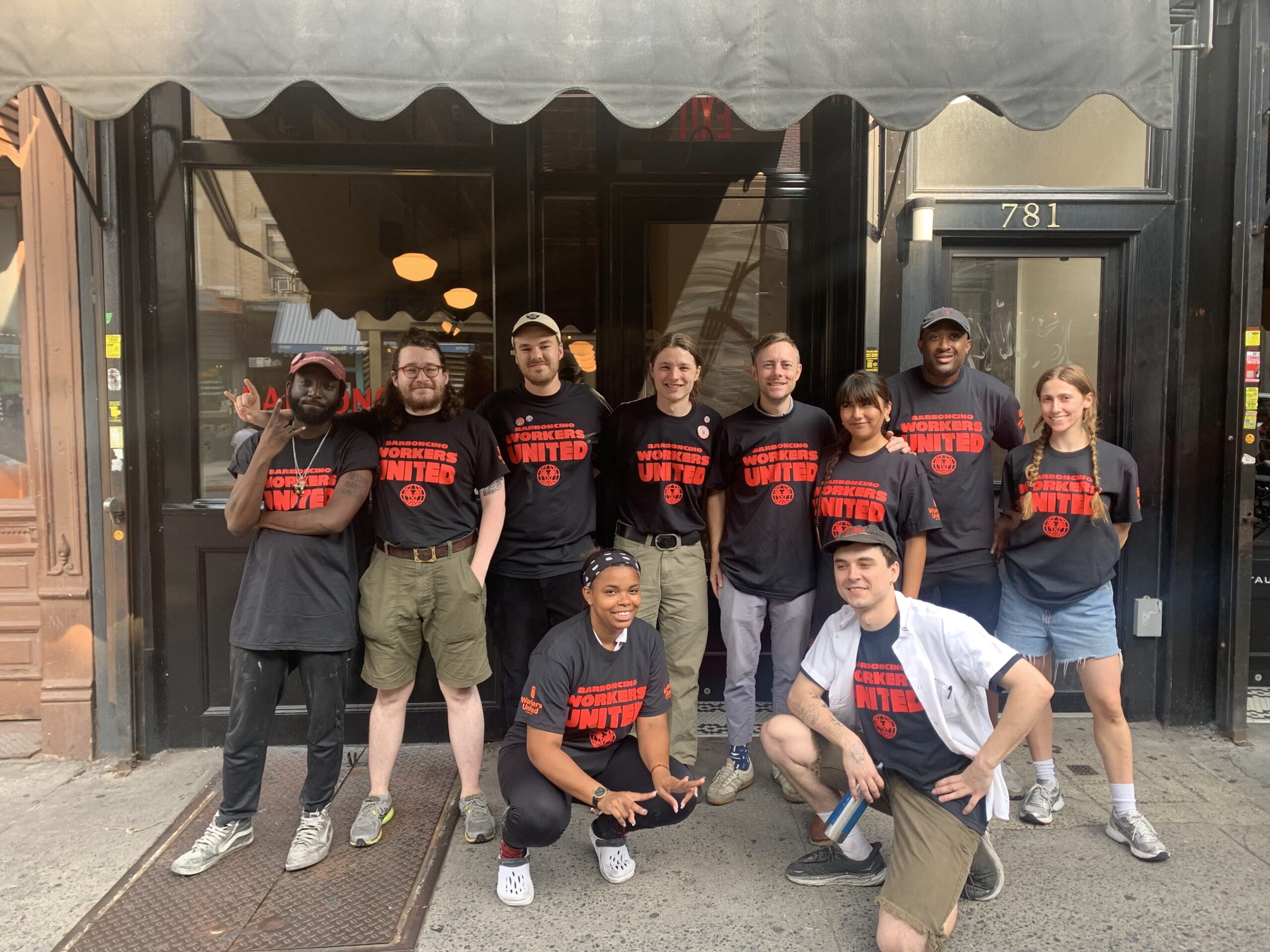On July 26, 2023, in a unanimous election, workers at Barboncino, a pizzeria in Crown Heights, voted to join Workers United, becoming the first unionized pizzeria in New York City. Workers at Barboncino organized to improve working conditions, calling for better wages, clear disciplinary procedures, and a zero-tolerance policy against harassment of all kinds. Luis Saavedra, a Research Associate at the CUNY Urban Food Policy Institute (CUFPI), interviews Alex Dinndorf of Barboncino Workers United and a Hunter College alumnus about his experience organizing at Barboncino and his perspective on labor rights education. Alex also shared his experience with students at CUFPI’s “Don’t Quit–Organize! A Free Workshop for CUNY Students on Workplace Organizing,” which took place on October 10, 2023.
Luis Saavedra (LS): YOU’VE WORKED IN FOOD SERVICE FOR OVER A DECADE, AND CURRENTLY WORK AT BARBONCINO, THE FIRST UNIONIZED PIZZERIA IN NEW YORK CITY. WHAT DREW YOU TO THAT WORK? HOW DID YOUR WORKING CONDITIONS IMPACT YOUR DECISION TO ORGANIZE WITH YOUR CO-WORKERS AT BARBONCINO? AND HOW DID YOU ACCOMPLISH THAT?
Alex Dinndorf (AD): I started working at Barboncino two years ago as a server and busser. Prior to Barboncino, I worked at Catfish in Crown Heights and have held different back and front-of-the-house positions ever since I started working in fast food in high school. Lots of workers apply to Barboncino because everyone knows everyone; in fact, my roommate got me the job. It’s a special group of workers. Before getting the job at Barboncino, I already knew the staff from hanging out at Super Power [bar in Crown Heights].
I’ve always been mobilized into action by the working conditions in the sector. In 2016, I made $9 an hour at a place in Chelsea and that radicalized me as a food service worker rights advocate. I knew very confidently that I was a worker and I deserved more. We had a flood that kicked things off at Barboncino. A sewage pipe exploded during service and workers had to clean it up. Our basement was flooded with brown water, toilet paper, and feminine hygiene products. The flood damaged the shop vac so the workers had to use buckets to bail the water. After cleaning up the mess they were told that if they didn’t return to work they would be fired. I’m proud that my coworkers walked off the job and a manager thankfully covered for them. Shortly after, we started organizing with the Emergency Workplace Organizing Committee (EWOC) and then eventually Workers United.
Unions require workers who care about each other—unions make sense for this industry and that is what makes our campaign so effective and gave us the unanimous win. Once workers learned what protections they could have, they wanted to unionize. I think the career food service workers understood this the most. It takes time though. I have always followed the principle that “organizing moves at the speed of trust.” If you build rapport with a worker, you can have an organizing conversation with them. If you listen to a worker, you can speak to them, and if you take a risk for a worker, they will take a risk with you.
LS: GIVEN YOUR EXPERIENCE ORGANIZING, WHAT DO YOU VIEW AS JUST AND FAIR WORKING CONDITIONS?
AD: We’re not going to leave the table until we face off with a lot of operational changes. It’s not just about wages, which are low, for the front-of-the-house workers, even lower.
The working conditions at Barboncino are representative of food service at large. It’s not a Barboncino problem, it’s a service industry problem. Arbitrary discipline, sexual harassment, low wages, injuries, unfair scheduling, lack of healthcare, etc. Employees in food service are extremely exploited. Every worker in the industry can relate to this.
Restaurants are some of the least regulated businesses in the country. Power resides in the hands of a few small business owners or corporate restaurant groups. Increasingly corporate restaurant groups. Skimming and wage theft are rampant. I encourage you to look at the map that nywagetheft.com made, which shows that wage theft is an ubiquitous practice in New York.
At-will employment is dangerous in restaurants particularly because of the hazards. Lots of knives, burns, falls/slips, etc. Workers get fired all the time for saying that it’s not safe. Occupational Safety and Health Administration (OSHA) rules are constantly violated in restaurants. For instance, my coworker was cut recently while disposing of broken glass that was placed in plastic trash bags. He had no idea what was in there.
At-will employment gets in the way of what’s right too. Workers put themselves at great risk if they tell a manager that “I don’t want to serve that customer because his friends are racist,” or if they are being sexually harassed. The only recourse most employees have is to “tell a manager.” If they repeatedly tell the manager, then they are seen as the problem.
A union culture is now present at Barboncino. Workers can express themselves more freely than ever. It’s important to emphasize this when encouraging workers to start unionizing because your working conditions improve directly after your election. Weingarten rights, lawyers, visibility. It protects workers before the contract and it can be achieved fairly quickly.
Winning unanimously like we did means that we present ourselves imposingly at the restaurant. We wear union shirts talk openly about our working conditions on the floor and make complaints. Workers are more protected, especially in a smaller shop like ours. We’re fighting a millionaire instead of a billionaire like Starbucks Workers United. This changes the campaign a lot.
Restaurants are very segregated businesses and our contract is fighting back at this. Black and Hispanic workers have always been the most exploited. A friend of mine works at a restaurant in Red Hook that does not let back-of-the-house workers walk through the dining room because of their “aesthetic.” We demanded a union contract that takes zero-tolerance seriously, and we will enforce this ourselves. If there’s someone we want to ban from the restaurant we are going to ban them. We had a situation where a manager at Barboncino told a worker that he needs to walk differently. It’s unacceptable.
Our contract proposal has clauses that ban ICE agents from entering the restaurant or prohibit re-verification of documents unless legally necessary. We were inspired by the hotel workers in California for this.
LS: UNIONS OFTEN PLAY THE ROLE OF EDUCATING WORKERS ON THEIR RIGHTS IN THE WORKPLACE. HOW CAN OTHER ORGANIZATIONS, SUCH AS PUBLIC COLLEGES, HELP DO SOME OF THAT LABOR EDUCATION?
AD: Immediately I want to see Labor Notes style in-person classes for CUNY students. I want to talk to CUNY undergraduates the most and show them how to have an organizing conversation at their workplaces. To accomplish this I think it will have to be organized through student groups first. For example, some EWOC volunteers and I facilitated a workshop for CUNY students at the CUNY School of Urban and Labor Studies. Professors play an important role in promoting these events and encouraging their students to go, maybe even incentivizing them with some kind of credit or doing it as a substitute for class time.
LS: RECALLING YOUR TIME AT HUNTER COLLEGE AND NOW AS PART OF BARBONCINO WORKERS UNITED, WHAT ACTIONS CAN CUNY TAKE TO TRANSFORM THE WORKPLACES OF CUNY STUDENTS WORKING IN FOOD?
AD: I had a very difficult time at CUNY. I always felt like I wasn’t being listened to. It was an alternative to be a radical worker despite being around so many other exploited workers. I felt out of place with the administration, parts of the faculty, and parts of the student body.
Hunter students deserve a lot more from CUNY. 17,000 Hunter students share one library for instance. I used to do my homework on the B2 floor, which had a reputation as the place where working students would sleep. Hunter is a commuter school and you can see how overworked these students are constantly. Students are napping in the basement of that library because they have been riding tri-state area buses and trains all day long. It made me so heartbroken to hear so many of my peers say things like “How are we going to afford it?” I had this constant feeling that workers were being betrayed. If they are not being educated, they are being betrayed. Those same students sleeping in the basement were off to a mandatory class where they learned about civics from a teacher who had no interest in criticizing wealth or systems of oppression and inequities. The system perpetuates itself, which fills me with so much despair. The irony is that more students at CUNY have full-time jobs than any other students I know. CUNY is the perfect place to create future union activists. They finish class and go right to work, but they are not being provided with the labor rights education and resources for their empowerment as workers. We must stay vigilant.
LS: LASTLY, WHAT’S NEXT IN BARBONCINO WORKERS UNITED EFFORTS/AGENDA?
AD: Currently, we are in contract negotiations. I am influenced by Jane McAlevey’s principles about open bargaining. I just finished her new book Rules to Win By and I recommend it. I want to do everything I can to make these talks as democratic as possible. This is a strategic decision as much as it is an ethical principle. People are only engaged to the extent that they participate — and they only participate to the extent they are engaged. The process is a large structure test of sorts. Barboncino’s biggest strength is how involved its workers are. This is why open bargaining is the answer. We are very popular and workers care. That’s where power comes from.
I am still learning about contract tactics and I trust McAlevey and other progressive organizers. I am behind on making a power structure analysis, where you map out all of the political connections a business has — schools, churches, community boards, politicians, etc. I am excited to do this with my union.
Barboncino Workers United is a project about making a model union restaurant that can be scaled. We know Barboncino is the first unionized pizzeria but not the last, especially with the growing popularity of unions. My focus is on winning the fight at Barboncino. On the side, I am already working with two other restaurants as a volunteer organizer with EWOC. We are building a new scene and I want this to be the infrastructure and power that allows workers to build food service unions in New York. An example needs to be set.

ABOUT INTERVIEWEE:
Alex Dinndorf is a server and busser at Barboncino, the first unionized pizzeria in New York City. As part of Barboncino Workers United, he helps lead organizing and negotiations. He graduated from Hunter College in 2022 with a Bachelor of Arts in English and Political Science. Additionally, Alex volunteers with the Emergency Workplace Organizing Committee, supporting worker organizing efforts.
